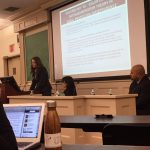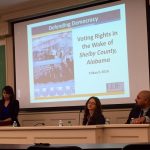
For Immediate Release: Date: March 4, 2024 | Contact: Rahat N. Babar, Deputy Executive Director for Policy |
WASHINGTON – The National Asian Pacific American Bar Association (NAPABA) applauds the United States Senate’s reintroduction of the John R. Lewis Voting Rights Advancement Act, a bill that would restore critical protections of the Voting Rights Act. Especially in a critical election year, Congress must ensure that everyone can fully participate in our democracy. This month, we commemorate the 59th anniversary of Bloody Sunday, when, on March 7, 1965, in Selma, Alabama, State Troopers attacked hundreds of unarmed protestors, including the civil rights leader John Lewis, who opposed the systematic oppression of Black voters. It led to the ultimate passage of the Voting Rights Act. As those activists knew then, and as we are reminded today, the right to vote is foundational, and as an organization advancing the interests of the AANHPI community, NAPABA realizes the critical importance for our community to have equal access to the ballot.
“The endeavor to secure equal voting rights requires constant vigilance,” said Anna Mercado Clark, President of NAPABA. “The life and legacy of John Lewis are a powerful reminder of it. NAPABA is grateful to Senators Durbin, Warnock, Schumer, and the sponsors for reintroducing the John R. Lewis Voting Rights Advancement Act. As the Asian American community is the fastest-growing community in the nation, coupled with recent court decisions that have limited the reach of the Voting Rights Act, this bill will go a long way to ensure that our community – and all communities of color – have a fair opportunity to make their voice heard at the ballot box.”
On top of our advocacy, if you wish to learn about ways that you can get involved in your community, connect with our partner APIAVote: https://apiavote.org/get-involved/volunteer/
###
The National Asian Pacific American Bar Association (NAPABA) represents the interests of over 60,000 Asian Pacific American (APA) legal professionals and nearly 90 national, state, and local APA bar associations. NAPABA is a leader in addressing civil rights issues confronting Asian American, Native Hawaiian, and Pacific Islander communities. Through its national network, NAPABA provides a strong voice for increased diversity of the federal and state judiciaries, advocates for equal opportunity in the workplace, works to eliminate hate crimes and anti-immigrant sentiment, and promotes the professional development of people of all backgrounds in the legal profession.






